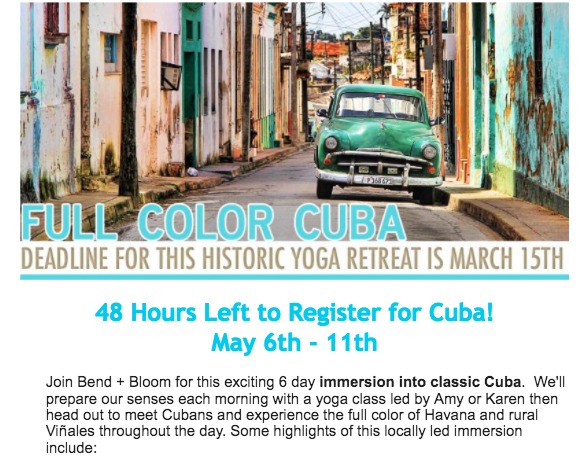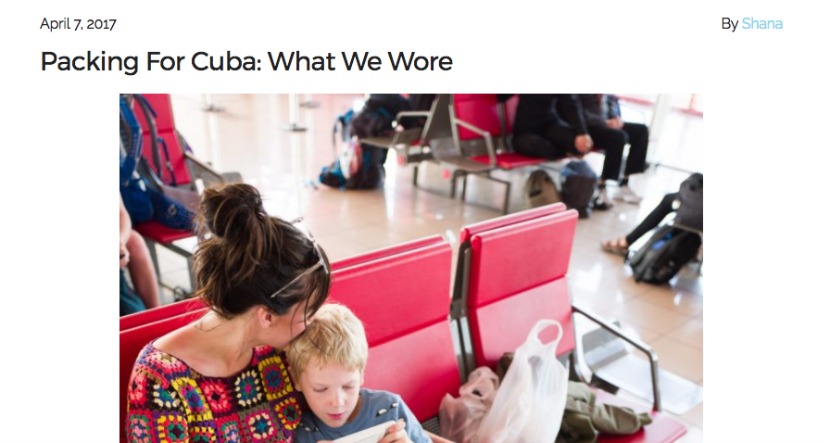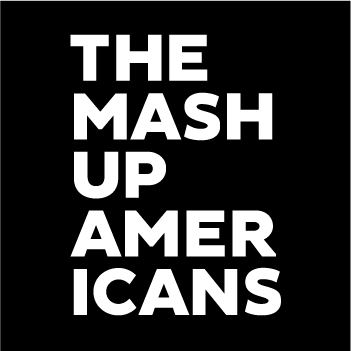For many immigrant and first-generation Mash-Ups, nothing gives us greater joy than sharing the culture and beauty of our mother countries. The unique Cuban-American experience of being severed from our physical roots, however, deeply complicates this joy. What happens when we attempt to “go back”? What happens when we see our most sacred spaces being commodified by tourism? What is the experience of watching others travel to homes once totally isolated, to try and see it “before it gets ruined”? Our American Born Cuban Mash-Up Vanessa Garcia, author of White Light, one of NPR’s Best Books of 2015, goes in.
Things that make me go: Ommmmmmmmmm. Emails like the one below, which are popping up in my inbox with increasing frequency.

I was born in Miami, Havana’s satellite city, and have been to Cuba just three times in my life. One of those times was in 2014, with my mother, who had not seen the island since she was five years old. Because, let’s not forget, given the political and familial embargoes in place for over five decades, it’s a deep privilege to go to Cuba legally. A privilege that president Obama bestowed on us Americans when he gave his speech on December 17, 2014, announcing that “Today, the United States of America is changing its relationship with the people of Cuba.”
Let me be clear. It’s not that I think people can’t go to Cuba to practice yoga, for instance. And it’s not that I think people in Cuba shouldn’t be exposed to yoga, or not see Americans doing yoga in their country. Cubans already are practicing yoga. We won’t be “enlightening” them, trust me. There is, in fact, an intricate history of yoga in Cuba, as the practice allows many to find inner freedom, when external freedoms are limited by the political dictatorship. And I think it’s an incredible thing for families to bring their young children to Cuba, to experience its beauty and learn about its culture — you know, all the reasons why one travels as a family.
And yet.


How many of us traveling to Cuba now, as tourists, recognize that privilege? When I read stories like the one above, from a style blogger, I wonder about the choices we are making, as Americans, in how we represent ourselves. I read those headlines and I think of us as teenagers packing for a “colorful” trip that we need to make sure we look good on because, OMG, it’s, like, Cuba, hello! Check out my outfit against the backdrop of vintage cars! Look at how the Cuban sunrise is the perfect backdrop for a sun salutation on Instagram!
Here’s what I think about, when I think about Cuba.
Here’s what I think about, when I think about Cuba: I think about hot days with no respite, no air conditioning. Storms that come, circling from the sea, and hit Havana hard, destroying her old and crumbling buildings. These storms leave people without roofs — my family — with leaks that last for seasons on end.
I think of the fact that there’s a group called Cuba Decide that nobody is talking about, which is trying to bring a plebiscite to the island — a direct vote from the people for free elections. Because, yeah that’s right, Cuba hasn’t had a free election since long before 1959 (Fulgencio Batista, who Fidel Castro ousted, rose to power himself through a military coup). I think about all the people that risk their lives to leave Cuba, walk through the Amazon, jump into the sea.
I think about the desperation, the censorship, the fear the Cuban people face. The fact that you have to listen closely in Cuba, because one word means four. And if you don’t understand what you’re listening for, you might miss everything. You might miss the boat, miss the plot, miss the true depths of your trip to Cuba.
If you’re too busy figuring out what you’re going to wear, in other words, you might not hear what the cab driver is trying to tell you. You might not figure out that your ride to the Ayurveda workshop is causing a Cuban to miss work. Those same almendrones (those cool, old American cars you like so much), they’re the same cars that take Cubans to work. If there are less of them around for Cubans, a Cuban might have to catch three busses and a long walk to get from point A to B.
I’m not saying you can’t look cute and have fun when you go to Cuba. I’m just saying in Cuba, there’s always more than meets the eye, and what we talk about when we talk about Cuba, when we come back to the States — it matters. What we talk about while we are there, as Americans, that matters too. And what we write about, what we leave behind, that matters most of all.
When Cubans saw Beyoncé appear in Cuba in 2013, they thought: Ochún
You want to write about clothes: Ok, here we go. When Cubans saw Beyoncé appear in Cuba in 2013, dressed in yellow, hair up in micro braids, walking through the streets, they thought: Ochún. Many Cubans have told me this. Ochún is the Yoruba deity or orisha that represents love, femininity, the river. In Cuba, she merges, or mashes up, with La Virgen de la Caridad del Cobre. Both Ochún and Cachita, which is what Cubans call La Caridad del Cobre, dress in yellow. Cachita is said to watch over all those Cubans that venture on water, including all the rafters that risked their lives to leave the island, some who died in her arms. You can write a book about the response to Beyoncé, based on the color she wore. A book that would include a religious and cultural understanding of the island, about what America means to Cubans — much deeper than just naming the designer, or talking about how “hot” Queen Bey looked.
Because in Cuba, one word means four. And what we talk about when we talk about Cuba, matters.
Not too long ago, in 2015, I attended a panel at the LA Festival of Books called “Moving Beyond the ‘Cuba Cliché’ and Getting to the Real Cuba.” There were two white women on the panel, and a white moderator. Not a single Cuban, Cuban-American, or American-Born-Cuban to represent the island. I sat in the audience listening to the Times Assistant Managing Editor, Alice Short, and journalist, Catherine Watson, reinforce Cuba cliché’s instead of breaking them. I listened to them talk about the music, the rum, and the “wonderful people,” that ubiquitous phrase of privileged tourism.
Ommmmmmmmm.
Something Watson said at the end of her panel that I thought was poignant, however, was that Cuban people “were aware of us [Americans] in a way that we are not aware of them.” Maybe that’s because we’re not listening.
The Cubans have something on the island called El Paquete. A “package” of media – film, music, TV, etc — which they download onto hard drives and distribute. It’s big, about 1 terabyte of content from around the world, that serves as a substitute for the internet they don’t have access to. It’s limited and underground, but it’s something. Through the paquete and conversations that arise from it, Cubans try to understand Americans and the world outside their island. The hope is, of course, that when they finally meet us, we are able to show them that we are more than just a sack of navel-gazers. The hope is we can extend our ear, in return, come back to the States with something less vague to talk about than how “great” the people were, or how much we improved our downward dog while in Havana.
I sit on a fence. This is not just the fence between two homes, or two countries. This is the hedge of a maze. Kind of like yoga’s middle way, if we’re going to take yoga for what it really is. This middle view is a harder view to decipher than what lies on either side of the hedge, but it’s an important one. One that can prevent us from reducing Cuba to its hot spots and salt-sprayed surfaces. Just as it prevents us from reducing ourselves, as Americans, to our own slick facades. Because when we fail to look more deeply, we lose the underpinnings of politics and culture that punctuate the day-to-day life of the Cuban and the American. We lose the principles behind what it means to truly have a meaningful relationship with Cuba, instead of a summer fling.
How do you change when you travel? Tell us your story.
You might also dig:
Where Do You Feel Most At Home?

